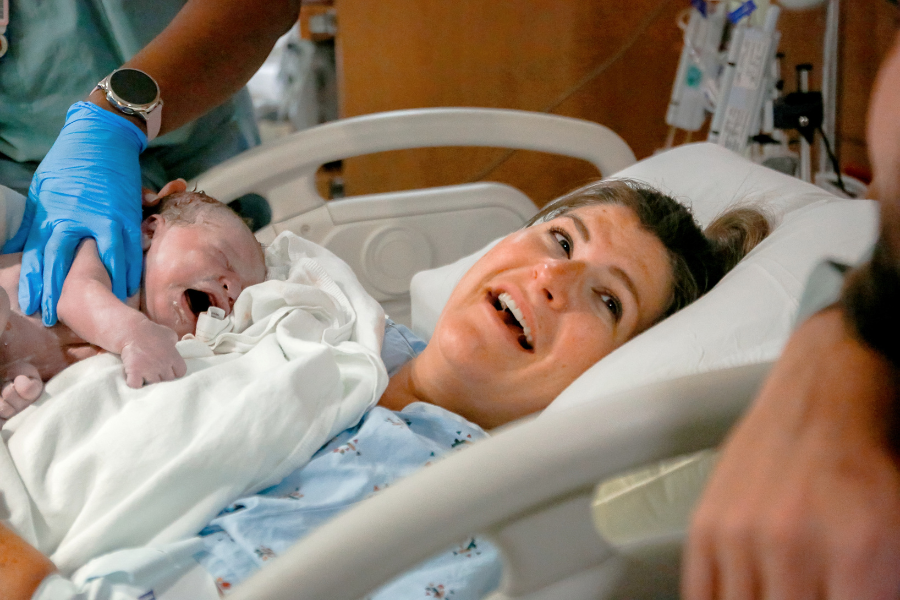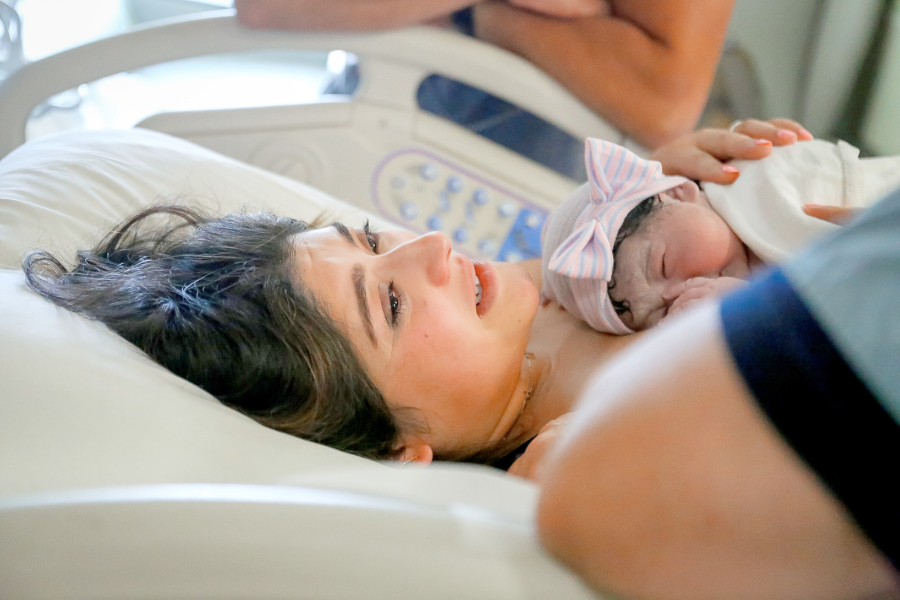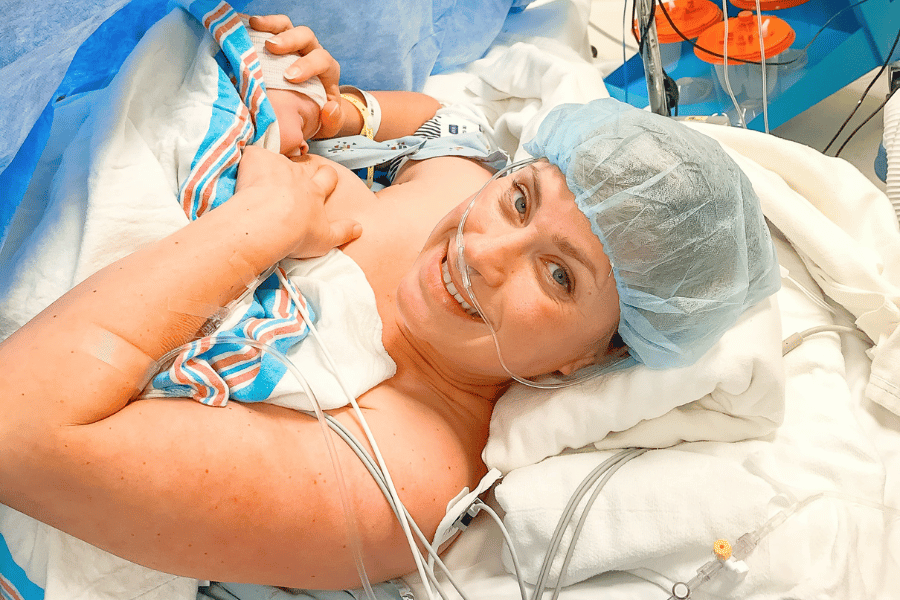If you are reading this and are currently pregnant then I’m sure you are all too familiar with bloating in pregnancy. Pregnancy bloating is not caused by just one thing. There are actually several things that can cause bloating in pregnancy, and today we’re going to unpack them all, and more!
So if you are ready to get to the bottom of pregnancy bloating: what it is, when it starts, when it stops, and how to cope – you are in the right place. Without wasting another second, let’s dive right in!
Follow @mommy.labornurse on Instagram to join our community of over 650k for education, tips, and solidarity on all things pregnancy, birth, and postpartum!
What is pregnancy bloating?
Bloating is a swollen state caused by the retention of fluid or gas. Simply put, it is bloating that occurs during pregnancy – makes sense, right? Unfortunately, bloating in pregnancy is all too common.
Signs of bloating in pregnancy
Bloating can feel like you have air trapped in your belly. Almost like you have a balloon in your stomach that you want to just pop with a little pin.
Other signs of bloating in pregnancy might include a little extra tummy “bulge”, stomach discomfort, and an increased amount of gas.
When does bloating start in pregnancy?
Bloating can start pretttty early on actually. A lot of women start feeling bloated before they even miss their period or take a pregnancy test.
And guess what?! There’s a pathological reason why bloating happens early in pregnancy. You see, your body secretes the hormone progesterone after conception. Progesterone plays a very important role in pregnancy but it also can slow digestion and gastrointestinal motility.
Motility refers to the movement of food through your body. Decreased motility can leave you feeling constipated, gassy, and full.
Not everyone experiences bloating during pregnancy. Those that do may experience varying degrees, which explains why some experience it earlier than others and some more extreme than others!
Is bloating a sign of pregnancy
I wouldn’t recommend using the presence of bloating as confirmation of pregnancy. However, bloating can happen and is fairly common in pregnancy.
Like I said above, some women experience it very early in pregnancy – even before they take a pregnancy test. In fact, the early bloating (and maybe some other signs too) is what prompts some women to take a test in the first place!
The somewhat tricky thing though is that bloating can also happen leading up to a woman’s menstrual cycle. All the more reason to not rely on bloating alone as a confirmation of pregnancy.
Related Reading: Early Signs of Pregnancy & Weird Pregnancy Symptoms That Are Actually a Thing
Extreme bloating in early pregnancy
One cause of bloating in early pregnancy is an increase in the hormone, progesterone, discussed above. Progesterone levels, which rise pretty drastically during the first trimester, cause digestion to slow.
Different women respond differently to certain hormones, which leads me to my next point. Some women experience extreme bloating in early pregnancy while some only experience mild bloating, or none at all.
In addition to the dramatic increase in progesterone, there are other factors that might contribute to extreme bloating. Some of these factors, more specific to diet and exercise habits, might cause you to experience more (or less) bloating early in pregnancy.
When does bloating stop in pregnancy?
A lot of women get a little break from bloating once they come out of the first trimester. Towards the end of the first trimester, around weeks 10-12, the placenta takes over hormone production.
Because of this, many women feel some relief from some of those pesky, early pregnancy symptoms, namely bloating and morning sickness.
Unfortunately, bloating can and frequently does, return towards the end of pregnancy. This time however, the cause of the bloating is usually related to your growing baby pushing on all kinds of things inside your body.
As your baby grows, they can put pressure on certain organs, including those that aid in digestion. When this happens, things can get a little backed up leading to constipation, bloating, and indigestion.
How long does bloating last in pregnancy?
Each person is different, so there’s not a one size fits all answer to this question. What’s more, I talked about how most women get a little “bloat break” during the second trimester but then have the pleasure of it revisiting towards the end of pregnancy.
So if you are adding up the weeks in the beginning of pregnancy with the weeks towards the end of pregnancy, there’s a chance you might spend a good portion of your pregnancy feeling the bloat.
How to get rid of bloating during pregnancy?
There are a few things you can do to combat bloating during pregnancy. Below you will find 5 ways to help you cope.
1. Stay hydrated
Staying hydrated during pregnancy is important for so many reasons! One of those reasons is to keep your digestive tract lubricated.
Water requirements are a little bit higher during pregnancy, but basically aim to drink as much water as needed to keep your urine pale yellow or clear in color. For most women this is around ten 8 oz cups of water a day.

2. Smaller meals
Consuming smaller, more frequent meals throughout the day can help with constipation and bloating too. Aim for 6 smaller meals throughout the day instead of 3 big ones. Not only will this help your digestion but it can also keep your blood sugar more stable.
In addition to smaller, more frequent meals, you should also eat slower. This goes for pregnancy or not. Eating slower gives your stomach time to catch up with your brain and helps to prevent overeating.
3. Increase fiber intake
There are so many benefits from consuming the right amount of fiber. Realize I said the right amount. There is such a thing as eating too much fiber. As a pregnant person, you have a few things working against you when it comes to constipation.
Consuming 25-30 grams of fiber per day can help keep that digestive system moving. Some examples of high fiber foods include:
- Collard greens
- Sweet potatoes
- Avocado
- Raspberries
- Whole wheat pasta
- Quinoa
- Kidney beans
- Black beans
4. Get moving
Moving your body (like staying hydrated) has so many health benefits. Physical activity increases blood flow to your digestive tract, which helps move food through and prevent constipation.
If you are looking for some pregnancy-safe exercises look no further than the post below!
5. Avoid gas inducing foods
This is where the whole too much fiber thing comes in. Some of the foods that are high in fiber are also foods that can cause gas – the beans and greens in particular.
If you do begin noticing more bloating than normal, I recommend keeping a food journal to try and pinpoint a trend or certain foods that might be triggering it.
Help with other pregnancy symptoms
There you have it – all the info you could ever want about pregnancy bloating! Hopefully I have provided you with some helpful tips to help keep it at ease.
And if you find yourself suffering from other common pregnancy ailments, be sure to check out the articles below to learn more!





